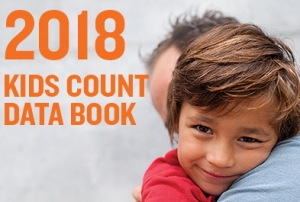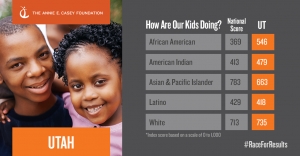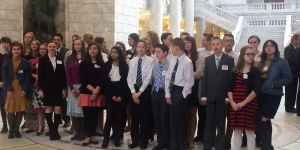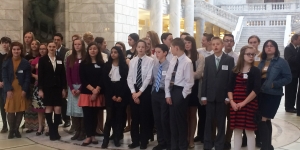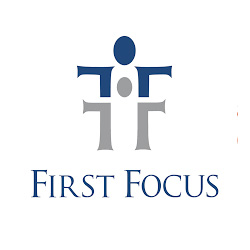Kids Count
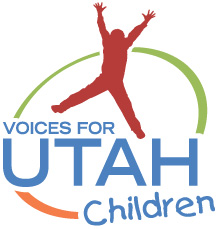
Released: Wednesday, June 27 at 12:01 a.m. ET
Contact: Terry Haven 801-554-6570
Utah Ranks Sixth Nationwide in Child Well-Being
Data shows the state struggles in the area of health where the child death rate continues to worsen.
Salt Lake City — Utah ranks sixth when it comes to overall child well-being according to the 2018 KIDS COUNT Data Book, released today by the Annie E. Casey Foundation. The state saw improvement in the majority of the 16 indicators included in the publication. Yet, despite positive trends across three out of four of the domains, advocates at Voices for Utah Children are concerned about the health domain where two out of the four indicators worsened.
Utah saw a 3 percent increase in the percent of low birthweight babies that dropped the state from 12th in 2010 to 15th in 2016. Similarly, the state saw an 8 percent rise in the child and teen death rate between 2010 and 2016, ranking Utah 20th. The percentage of children without health insurance, while improving along with the rest of the nation, was our lowest ranking at 40th in 2016.
“Utah has made progress improving our child insurance rate thanks to CHIP, Medicaid and the Affordable Care Act, but we are still lagging behind the rest of the nation. We need to follow the lead of high-performing states by expanding Medicaid, helping kids stay covered year-round by improving Medicaid eligibility and outreach, and ensuring that immigration status is not a barrier to kids’ coverage,” says Jessie Mandel, Senior Health Policy Analyst for Voices for Utah Children.
Part of the rise in child and teen death rates can be attributed to a rising suicide rate among teens. Voices for Utah Children sees a need for more school-based services. “The critical shortage of school nurses and counselors highlights the need for more school-based healthcare services. Kids need a place to go for care and support before a condition or a problem escalates,” says Mandel.
The annual KIDS COUNT Data Book uses 16 indicators to rank each state across four domains — health, education, economic well-being and family and community — as an assessment of child well-being. Utah ranks:
- 7th in economic well-being. Utah families have experienced significant progress in economic security with a 31 percent decrease in the percentage of children living in poverty compared to 2010.
- 12th in education. With 58 percent of children ages three and four not attending school, preschool attendance and early education continues to lag behind the nation where only 52 percent of children are not in school. Utah ranked 36th on this indicator, our second to the lowest ranking for the state, slightly above the ranking for percent of children without health insurance.
- 1st in the family and community domain. Teen birth rates are at an all-time low nationwide, and Utah is no exception, improving from 28 births per 1,000 teens in 2010 to 16 births in 2016. Utah ranks 11th on this indicator.
- 19th in health. Utah lags behind the rest of the nation with regard to the percentage of children who still lack health insurance. More investments in state programs are needed to reach the 54,000 children statewide who remain uninsured.
This year’s Data Book focuses on the upcoming 2020 national census, the results of which will determine the future of federally-funded programs for the next decade, putting key drivers of child success and well-being at risk of losing funding if all children are not counted. Nationally, the child undercount continues to rise and Utah is no different.
“With potentially 9 percent of Utah kids at risk of being undercounted in the upcoming 2020 census, federally-funded supports that have driven youth success are in jeopardy,” says Terry Haven, Deputy Director for Voices for Utah Children. “Given our negative trends in the health domain, a child undercount will impact the amount of funds Utah will have to help change the trajectory of worsening health trends.”
In Utah, over $1 billion in federal funds are distributed based on the decennial census each year. The upward trends in the four major areas of child well-being signal that existing resources and systems are benefiting kids’ progress. They also underscore the importance of maintaining federal funding so children in Utah can continue to prosper. Traditionally, low-income children, children of color and kids living in immigrant families stand to be disproportionately undercounted and have the most to lose as vital programs face reductions in funding. Children and families living in rural areas and on reservations also are at risk of missing from the census and stand to lose their existing share of political representation and a voice for their children.
Release Information
The 2018 KIDS COUNT® Data Book will be available June 27 at 12:01 a.m. EDT at www.aecf.org. Additional information is available at www.aecf.org/databook, which also contains the most recent national, state and local data on hundreds of indicators of child well-being. Journalists interested in creating maps, graphs and rankings in stories about the Data Book can use the KIDS COUNT Data Center at datacenter.kidscount.org.
About Voices for Utah Children
Voices for Utah Children works to make Utah a place where all children thrive. We start with one basic question: "Is it good for kids?" At Voices for Utah Children, we believe that every child deserves the opportunity to reach his or her full potential. And to achieve this vision, we focus on five key areas that benefit the healthy development of all children: Health, School readiness, Safety, Economic Stability, and Diversity.
About the Annie E. Casey Foundation
The Annie E. Casey Foundation creates a brighter future for the nation’s children by developing solutions to strengthen families, build paths to economic opportunity and transform struggling communities into safer and healthier places to live, work and grow. For more information, visit www.aecf.org. KIDS COUNT® is a registered trademark of the Annie E. Casey Foundation.
###
Good Data Makes KIDS COUNT
The 2018 Legislative Session is in full swing. A myriad of bills are moving through the process, sometimes at a snail’s pace and other times faster than advocates can keep up. But before any of the bills got drafted, sometimes before the bills were even twinkles in a mind’s eye, there was data. The KIDS COUNT Project’s main premise is that in order to create good policy change for kids we must have good data.
One of the most used and easily accessed sources of data is the U. S. Census Bureau and one of the most familiar data source is the Decennial Census. People and organizations all over the country are already gearing up for the next decennial census in 2020. It’s a huge project and (at this point) underfunded. But there are a host of other data sources from the Census Bureau that provide data used by advocates, the media, policymakers, city planners, and grant writers. Throughout the year the Utah KIDS COUNT Project will be highlighting data sources from the Census Bureau with a series of Data Links that showcase the data from a variety of geographic levels, different databases, and topics. The first in the series, “A Tale of Four Cities,” features data on four major cities in Utah from the 2012-2016 American Community Survey.
Gathering and analyzing data is the first step in making informed policy decisions and ensures that the state makes smart changes for children and families. Watch for new Data Links every other month and get educated about the wealth of data available for you work on behalf of Utah’s kids.
To view Utah Kids Count Data Link: February 2018 click here.
Utah KIDS COUNT Data Links Publication, February 2018
A Tale of Four Cities: A demographic Look at Ogden, Provo, St. George, and Salt Lake City.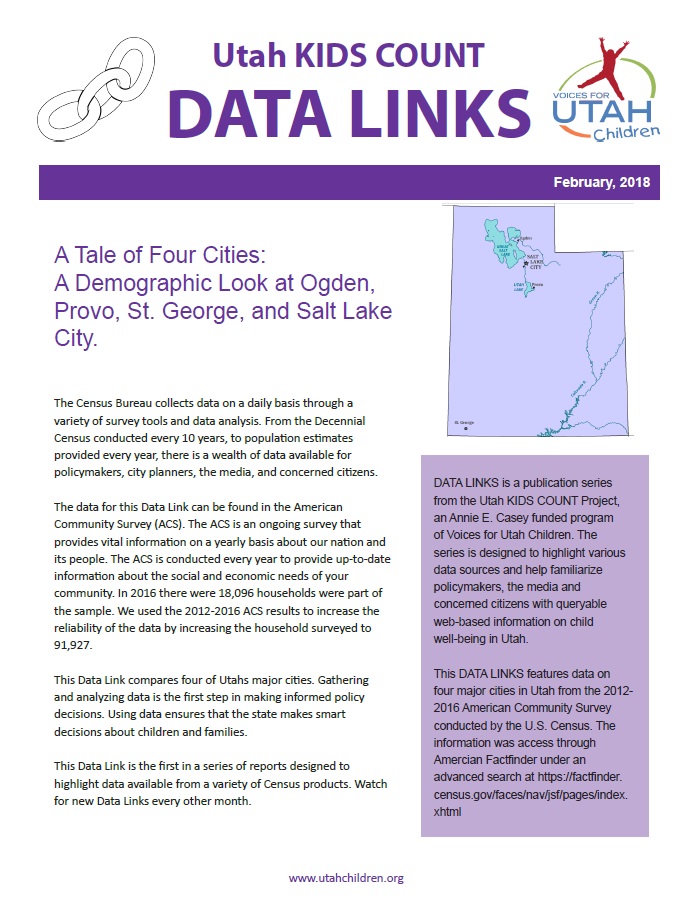
This Data Link compares four of Utahs major cities. Gathering and analyzing data is the first step in making informed policy decisions. Using data ensures that the state makes smart decisions about children and families. This Data Link is the first in a series of reports designed to highlight data available from a variety of Census products. Watch for new Data Links every other month.
To view publication click here.
Children of Color Face Persistent Inequities in Utah
The recently released Annie E. Casey Foundation report, 2017 Race for Results: Building a Path to Opportunity for All Children report, shows that Utah’s children in immigrant families and children of color are more likely to live in poverty, less likely to complete at least an associate’s degree, and more likely to live in families where the head of the household does not have a high school degree.
This year’s report focuses on children in immigrant families. Perhaps the most telling difference between children in immigrant families and children in U.S.-born families is the percentage of children living above 200 percent of poverty (a little over $48,000 for a family of four). While 67 percent of children in U.S.-born families in Utah live above 200 percent of poverty, only 42 percent of children in immigrant families have the same security. The level of inequity in the data is alarming, and the difference in poverty levels for our children of color and children in immigrant families is concerning as this one indicator impacts all the other indicators we study.
This is the second Race for Results report by the Casey Foundation; the first was released in 2014. The report uses an index to measure children’s progress on the national and state levels on key education, health and economic milestones by racial and ethnic groups. The index uses a composite score of these milestones on a scale of one (lowest) to 1,000 (highest) to make comparisons. In Utah, non-Hispanic white children clearly have more opportunities to reach milestones that lead to success.
The index out of 1000 for Utah:
Black/African American, 546, ranks 4th in U.S.
American Indian/Alaska Native, 479, ranks 12th in U.S.
Asian/Pacific Islander, 663, ranks 39th in U.S.
Hispanic/Latino, 418, ranks 30th in U.S.
White, 735, ranks 18th in U.S.
The 2017 report reveals improvement for all children in the percentage of children living above 200 percent of poverty when compared to the 2014 report, though just over a third of Hispanic and American Indian children and just under half of Black and Asian/Pacific Islander children live above 200% of poverty. The data also shows that immigrant children are more likely to live in two-parent families and that over 90 percent of females, ages 15-19, regardless of race, are delaying childbearing until adulthood.
Although progress has been made, it is evident that poverty in Utah must be addressed. While 70 percent of white children live in families above 200 percent of poverty, almost half of African American children and only a third of Hispanic/Latino and American Indian families live in families at or above 200% of poverty.
The Race for Results makes three recommendations to help close the gap in child well-being between children of color and their white counterparts: keeping families together, helping children meet key developmental milestones and increasing economic opportunity for immigrant parents.
Here in Utah we have one of the highest rates of uninsured children in the nation. To ensure Utah kids can be healthy and thrive and meet developmental goals, all kids, regardless of documentation status, need to have access to affordable health coverage. That’s why Voices for Utah Children is working on Medicaid expansion and continuous eligibility for Medicaid. Creating a state Earned Income Tax Credit would help move low-income working families out of poverty. And making sure that we close the school to prison pipeline will ensure that students reach their full potential.
It is essential that we move forward to implement a thoughtful process for creating policies and programs that promote equity for all children in Utah. The full report can be found at http://www.aecf.org/resources/2017-race-for-results/
It’s time to start preparing for the 2060 Presidential election. No, I’m serious. Today, somewhere in Utah, there are children who could run for President of the United States in 2060 and beyond.
I hope they are nurtured by parents who are economically secure and prepared to parent to the best of their ability. I hope they have stable, affordable, effective health care and have health insurance so they don’t worry about whether they can access care. I hope they have access to quality preschool if they need it so they are ready to learn when they start kindergarten. I hope they are taught by teachers who are valued; who are paid a wage that recognizes the important, valuable influence they have on a child’s intellect and ability to succeed. I hope they live in a community that supports them throughout their lives, that makes sure that all children in the community have what they need to succeed, not just those living in certain zip codes. I hope they live in communities that recognize that care for our environment means healthier, happier kids. And I hope they live in a society that values all life, all nationalities, all humanity. Because that kid could be the hero we need to bring a nation together.
Unfortunately, many kids don’t live this life in Utah today. As Diposh Navsaria said “We fail kids, long before they fail us.” Too many live below poverty in our state, 120,155 to be exact. If you want a visualization, that’s enough kids to fill the Huntsman Center, Vivint Smart Home Arena, Smiths Ballpark, Rice-Eccles Stadium, the Maverick Center, and the Dee Events Center at one time. And we don’t always provide these at-risk kids with the support they need.
All-day kindergarten is not available to all kids; quality, affordable preschool is not available to all kids; we have the lowest per pupil expenditures in the nation in a state where student population increases every year; we have one of the highest rates of uninsured kids in the nation, and we do have the highest rate of uninsured Hispanic kids.
Nationally, we continually fight to keep food stamps from being cut, we worry about cuts to the Children’s Health Insurance Program, we wonder if families will be torn apart in the same breath that we say how much we value families. And everywhere, across this nation and in Utah, sometimes your zip code determines if you succeed or fail. When will be learn that when our children succeed, our city, community, nation, and society succeed.
When will we understand that supporting children and families IS economic development. Because when we support our children, when we raise capable, loving, experienced children they become the bedrock and the foundation, of a successful society.
At Voices for Utah Children we always ask the question, “Is it Good for Kids?” when working on policies affecting children and families. We collect data, we do research, and we share information with experts across the United States. I want to be able to say that the future President of the United States from the great state of Utah could be any child in the state, not just the lucky ones born to the right parents, born in an affluent neighborhood, and born with the best chance of success. When asked “Is it good for the 2060 candidate for President”, I want our state to be able to say “yes, we did the best we could for all our children.” All our children had the opportunity to succeed. Hail to the future Chief!
 March 30, 2017 is Love UT Give UT!
March 30, 2017 is Love UT Give UT!
It’s a day for Utahns to give to the nonprofits that make Utah special. Every donation to Voices for Utah Children through Love UT Give UT gives Voices a chance to win matching grants and prizes—and gives you a chance to win a car!
And you don't have to wait! Donate now at http://bit.ly/loveUTchildren.
For 30 years now, Voices for Utah Children has called on our state, federal and local leaders to put children’s needs first. But the work is not done. The children of 30 years ago now have children of their own. Too many of these children are growing up in poverty, without access to healthcare or quality educational opportunities.
How can you be involved?
Make a tax-deductible donation to Voices for Utah Children—or join our Network with a monthly donation of $20 or more. Network membership includes complimentary admission to Network events with food, socializing, and opportunity to meet child advocacy experts. And don't forget to join our listserv to stay informed!
We look forward to the future of Voices for Utah Children and we hope you will be a part of our next 30 years.
Special thanks to American Express for sponsoring our 30th Anniversary Year. 
Pocket Cards for Utah Lawmakers
The basic premise of KIDS COUNT is that in order to affect good policy change for kids you must have good data on their well-being. In addition, to be the most effective, the data needs to be geographically relevant to the users. For many years, the Utah KIDS COUNT Project housed at Voices for Utah Children has produced a yearly county-by-county assessment of child well-being consisting of close to 30 indicators. This publication is given to all Utah’s legislators in the hope that they will use it to make reasonable, data-driven policy that benefits all Utah’s children and their families.
This legislative session, we took providing data one step further and created pocket sized data cards that are specific to just their districts. The 104 distinct cards provide statistics on 19 indicators of child well-being. We hope policymakers will use this data to promote effective policies and track the well-being of children to ensure that families are on paths to economic opportunity and communities are safe and healthy for all kids, regardless of race, class or zip code.
See them here:
For 30 years now, Voices for Utah Children has called on our state, federal and local leaders to put children’s needs first. But the work is not done. The children of 30 years ago now have children of their own. Too many of these children are growing up in poverty, without access to healthcare or quality educational opportunities.
How can you be involved?
Make a tax-deductible donation to Voices for Utah Children—or join our Network with a monthly donation of $20 or more. Network membership includes complimentary admission to Network events with food, socializing, and opportunity to meet child advocacy experts. And don't forget to join our listserv to stay informed!
We look forward to the future of Voices for Utah Children and we hope you will be a part of our next 30 years.
Special thanks to American Express, our "Making a Difference All Year Long" sponsor. 
2019 Utah Legislative Bill Tracker
Bill |
Sponsor |
Description |
Voices is |
House Bills |
|||
|
HB011 Property Tax Amendments |
Rep. Timothy Hawkes Sen. Daniel Hemmert |
This bill modifies the property tax valuation and appeals processes for county assessed real property. |
Following |
| HB017 Firearm Violence and Suicide Prevention Amendments |
Rep. Steve Eliason Sen. Curtis Bramble |
This bill reenacts and modifies previously sunsetted provisions relating to a voluntary firearm safety program and a suicide prevention education course. | Following |
|
HB024 Property Tax Exemptions, Deferrals, and Abatements Amendments |
Rep. Steve Eliason Sen. Daniel McCay |
This bill amends provisions related to property tax exemptions, deferrals, and abatements. |
Following |
|
HB025 Tax Commission Amendments |
Rep. Steve Eliason Sen. Lincoln Fillmore |
This bill modifies provisions relating to closed meetings held by the State Tax Commission. |
Following |
|
HB041 Transportation Sales Tax Amendments |
Rep. Kay Christofferson |
This bill modifies sales and use tax provisions relating to certain sales and use tax dedications. |
Following |
|
HB042 Utah Net Loss Effective Date Clarification |
Rep. Travis Seegmiller Sen. Curtis Bramble |
This bill modifies an uncodified effective date. |
Following |
|
HB047 Early Childhood Coordination Amendments |
Rep. V. Lowery Snow; Sen. Ann Millner |
This bill creates the Early Childhood Utah Advisory Council and the Governor's Early Childhood Commission. |
Priority Supporting |
|
HB049 Repatriation Transition Tax Amendments |
Rep. Steve Eliason Sen. Lincoln Fillmore |
This bill modifies corporate income tax provisions relating to deferred foreign income. |
Following |
|
HB071 Health Education Amendments |
Rep. Ray Ward Sen. Todd Weiler |
This bill amends provisions regarding instruction in health. |
Supporting |
|
HB087 Safe Storage of Firearms Amendments |
Rep. Elizabeth Weight |
This bill relates to firearm storage. |
Supporting |
| HB092 Violence Data Study |
Rep. Susan Pulsipher |
This bill establishes a grant award for a violence data study. | Following |
|
HB102 Campaign Funds Uses Amendments |
Rep. Stephanie Pitcher |
This bill allows candidates for public office to use campaign funds to pay for child care expenses incurred as part of campaign activities. |
Supporting |
|
HB103 Utah Intergenerational Poverty Work & Self-sufficiency Tax Credit. |
Rep. Robert Spendlove |
This bill enacts a state earned income tax credit. |
Priority Supporting |
|
HB120 Student and School Safety Assessment |
Rep. Ray Ward Sen. Ann Millner |
This bill enacts provisions related to school safety. |
Following |
|
HB129 Campaign Amendments |
Rep. Craig Hall Sen. Deidre Henderson |
This bill allows candidates for public office to use campaign funds to pay for child care expenses incurred as part of campaign activities. |
Supporting |
| HB153 Utah Vital Statistics Act Amendments |
Rep. Merrill Nelson Sen.Ralph Okerlund |
This bill amends provisions regarding the completion and amendment of a birth certificate. | Following |
| HB205 Railroad Crossing Amendments |
Rep. Joel Ferry |
This bill amends provisions related to the operation of a train that blocks traffic at a railroad crossing in a high-traffic area. |
Following |
| HB208 Safe Routes to School Program |
Rep. Suzanne Harrison Sen. Daniel Hemmert |
This bill requires the Department of Transportation to implement a program to provide safe routes to school. |
Supporting |
| HB209 Extreme Risk Protective Order |
Rep. Stephen Handy |
This bill creates the Extreme Risk Protective Order Act. |
Supporting |
|
HB210 Medicaid Expansion Program Revisions |
Rep. Ray Ward |
This bill amends provisions relating to Medicaid expansion. |
Priority Supporting |
|
HB234 Marriage Amendments |
Rep. Angela Romero Sen. Luz Escamilla |
This bill imposes an age, below which an individual may not marry and makes technical and conforming amendments. | Following |
| HB244 Misdemeanor Sentencing Timeline Clarifications |
Rep. Eric Hutchings Sen. Daniel Thatcher |
This bill reduces the maximum penalty for a misdemeanor conviction by one day to 364. |
Supporting |
| HB267 Prescription Drug Importation Program |
Rep. Norman Thurston Sen. Curtis Bramble |
This bill creates a program and reporting requirements relating to prescription drugs and the importation of prescription drugs. |
Supporting |
| HB274 Retail Tobacco Specialty Business Amendments |
Rep. Jennifer Dailey-Provost |
This bill amends provisions relating to the sale of flavored tobacco products. |
Supporting |
| HB275 Contraception for Women Prisoners |
Rep. Jennifer Dailey-Provost |
This bill requires that jails must continue to allow female prisoners access to contraceptives. | Following |
|
HB286 Financial and Economic Literacy Education Amendments |
Rep. Jefferson Moss Sen. Todd Weiler |
This bill amends provisions related to financial and economic literacy education. | Following |
| HB303 School Community Council Amendments |
Rep. Keven Stratton |
This bill modifies provisions related to the School LAND Trust Program. |
Following |
| HB317 Homeless Resource Center Drug-free Zone |
Rep. Steve Eliason |
This bill modifies provisions related to penalties for certain prohibited acts. | Following |
| HB324 Tobacco Age Amendments |
Rep. Steve Eliason Sen. Curtis Bramble |
This bill modifies the minimum age for obtaining, possessing, using, providing, or furnishing of tobacco products, paraphernalia, and under certain circumstances, electronic smoking devices from 19 to 20 then to 21 years of age. |
Supporting |
| HB333 Workforce Development Incentives Amendments |
Rep. Suzanne Harrison Sen. Jacob Anderegg |
This bill amends provisions related to tax credit incentives for economic development. |
Supporting |
| HB336 Nurse Practice Act Amendments |
Rep. James Dunnigan Sen. Curtis Bramble |
This bill amends provisions relating to the prescriptive authority of certain licensed nurse practitioners. |
Supporting |
| HB340 School Absenteeism and Truancy Amendments |
Rep. V. Lowry Snow |
This bill amends provisions related to truancy. |
Supporting |
| HB344 Student Asthma Relief Amendments |
Rep. Mark Wheatley Sen. Ronald Winterton |
This bill enacts provisions governing the administration of stock albuterol by certain entities to an individual. |
Supporting |
| HB360 School Water Testing Requirements |
Rep. Stephen Handy |
This bill enacts provisions related to monitoring and mitigating lead in drinking water in schools and child care centers. |
Supporting |
| HB371 Consent to Services for Homeless Youth |
Rep. Elizabeth Weight |
This bill relates to a homeless youth's ability to consent to a temporary shelter, care, or services. |
Supporting |
| HB373 Student Support Amendments |
Rep. Steve Eliason Sen. Ann Millner |
This bill repeals and enacts provisions related to school-based mental health support. |
Supporting |
| HB379 Intergenerational Poverty Solution |
Rep. Norman Thurston |
This bill creates the Earned Income and Education Savings Incentive Program. | Following |
| HB399 Prohibition of the Practice of Conversion Therapy upon Minors |
Rep. Craig Hall |
This bill prohibits certain health care professionals from providing conversion therapy to a minor; and adds a violation of the prohibition to the list of conduct that constitutes unprofessional conduct for licensing purposes. |
Followed- Bill was pulled |
| HB430 Prohibition of Genital Mutilation |
Rep. Ken Ivory |
This bill prohibits female genital mutilation and provides a penalty. | Following |
| HB441 Tax Equalization and Reduction Act |
Rep. Tim Quinn |
This bill modifies the sales tax rate by attempting to broaden the tax base and lowering the income tax from 4.9% to 4.7% |
Monitored - Bill was pulled. |
|
HR003 House Resolution Supporting Humane Response to Refugee Crisis |
Rep. Jen Dailey-Provost |
This House resolution urges a humane response to the immigration crisis at the U.S.-Mexico border. |
Supporting |
|
HCR004 Concurrent Resolution Supporting Utah's Every Kid Outdoors Initiative |
Rep. Patrice Arent Sen. Lincoln Fillmore |
This concurrent resolution expresses support for Utah's Every Kid Outdoors Initiative. |
Supporting |
| HCR005 Concurrent Resolution Urging Policies That Reduce Damage from Wildfires |
Rep. Raymond Ward Sen. Ronald Winterton |
This resolution urges the federal government to pursue policies that allow for easier reduction of excess forest fuel loads. |
Supporting |
| HJR008 Proposal to Amend Utah Constitution - Slavery and Involuntary Servitude Prohibition |
Rep. Sandra Hollins Sen. Jacob Anderegg |
This joint resolution of the Legislature proposes to amend the Utah Constitution to modify a provision prohibiting slavery and involuntary servitude. |
Supporting |
Senate Bills |
|||
|
SB012 FDIC Premium Deduction Amendments |
Sen. Jerry Stevenson Rep. Tim Quinn |
This bill modifies the Corporate Franchise and Income Taxes code and the Individual Income Tax Act by amending provisions relating to certain subtractions from unadjusted income or adjusted gross income. |
Following |
|
SB013 Income Tax Domicile Amendments |
Sen. Curtis Bramble Rep. Steve Eliason |
This bill modifies tax provisions relating to income tax domicile requirements. |
Following |
|
SB028 Income Tax Revisions |
Sen. Curtis Bramble Rep. Steve Eliason |
This bill modifies corporate income tax provisions. |
Following |
|
SB032 Indigent Defense Act Amendments |
Sen. Todd Weiler Rep. Michael McKell |
This bill amends provisions of Utah’s Indigent Defense Act to ensure appropriate legal representation for all young people appearing in juvenile court. |
Priority Supporting |
| SB038 Substitute Mental Health Amendments |
Sen. Lincoln Fillmore Rep. Brad Daw |
This bill amends provisions of the civil commitment code and the definition of "unprofessional conduct" applied to mental health professionals. |
Following |
|
SB041 Interest Deductions Amendments |
Sen. Daniel McCay |
This bill modifies the Corporate and Franchise Income Tax Act and the Individual Income Tax Act by amending provisions relating to additions and deductions for certain business interest. |
Following |
|
SB042 Tangible Personal Property Amendments |
Sen. Daniel McCay Rep. Karianne Lisonbee |
This bill provides for the exemption of certain tangible personal property from property tax if the tangible personal property is eligible for sales and use taxation. |
Following |
| SB083 Partnerships for Healthy Communities |
Sen. Ann Millner Rep. Paul Ray |
This bill creates the Partnerships for Healthy Communities Grant Program and will address the social determinants of health that affect early childhood health outcomes. |
Priority Supporting |
|
SB096 Medicaid Expansion Adjustments |
Sen. Allen Christensen Rep. James Dunnigan |
This bill amends provisions relating to the state Medicaid program and the state sales |
Opposing |
|
SB097 Medicaid Program Revisions |
Sen. Jacob Anderegg |
This bill repeals the expansion of the state Medicaid program under the Affordable Care Act and changes the sales tax rate. |
Opposing |
| SB103 Victim Targeting Penalty Enhancements |
Sen. Daniel Thatcher Rep. Lee Perry |
This bill enacts provisions relating to sentencing for a criminal offense committed against a victim who is selected because of certain personal attributes. | Following |
| SB106 Mental Health Services in Schools |
Sen. Lincoln Fillmore Rep. Susan Pulsipher |
This bill enacts provisions relating to coverage of certain mental health services by the Medicaid program and certain health insurers. |
Following |
|
SB110 Family Medical Unpaid Leave Amendments |
Sen. Daniel Hemmert Rep. Mike Schultz |
Provides state-eligible companies (those that have between 30 and 50 employees) to make available three weeks of unpaid medical leave to employees. |
Supporting |
| SB143 Public Education Vision Screening |
Sen. Luz Escamilla Rep. Brad Daw |
This bill modifies provisions regarding public education vision screening. |
Supporting |
| SB166 School Readiness Amendments |
Sen. Ann Millner Rep. Bradley Last |
This bill amends and enacts preschool provisions. |
Priority Supporting |
| SB222 Children's Outdoor Recreation Program |
Sen. Lincoln Fillmore Rep. Mike Winder |
This bill creates the Utah Children's Outdoor Recreation and Education Grant Program in the Governor's Office of Economic Development. |
Supporting |
|
SJR003 Proposal to Amend Utah Constitution - Tangible Personal Property Tax Exemption |
Sen. Daniel McCay |
This joint resolution of the Legislature proposes to amend the Utah Constitution to modify a provision relating to tangible personal property tax exemptions. |
Following |
2020 Utah Legislative Bill Tracker
|
Bill |
Sponsor |
Description |
Voices is |
House Bills |
|||
|
Juvenile Justice Bills |
|||
|
Rep. Snow |
Creates a standard definition for “truancy” and chronic truancy” and seeks to improve data reporting by schools to the state board of education |
Following |
|
|
Rep. Dailey-Provost |
Prevents the state from sending fees related to juvenile incarceration to debt collection |
Support |
|
|
Rep. Hall |
Requires law enforcement to notify a school when a student is under investigation for a violent felony or weapons offense, |
Following |
|
|
HB171 - School Threat Amendments |
Rep. Stoddard |
Defines the crime of threatening a school (or committing an intentional hoax threat), creates certain criminal penalties (including restitution for the costs of a school response to a threat), and requires a mental health assessment. |
Following |
|
Rep. Handy |
Enables a family member or law enforcement to ask a court to restrain a person from possessing any firearms or ammunition for a specified length of time; |
Support | |
|
Child Care and Early Education |
|||
|
Rep. Harrison |
Allows GOED to consider the “working parent benefits” that a company offers, when calculating potential incentives packages |
Support |
|
|
Rep. Arent |
Updates Utah’s “Safe Haven Law” to allow parents to leave newborn children, up to 30 days old, at a hospital, safely and without fear of criminal prosecution. Also includes provisions to ensure notification of fathers when possible, and to prevent birth record duplications |
Support |
|
|
Rep. Snow |
Expands state-funded Optional-Extended Day Kindergarten administered by Utah State Board of Education. Boosts current spending about 2.5 times |
Support |
|
|
Rep. Waldrip |
Expands teacher professional development program focused on early literacy to include numeracy skills and to boost embedded coaching/technical assistance support to educators. |
Support |
|
|
HB153 - Parental Leave Amendments |
Rep. Weight |
Directs state agencies (except for universities) to offer up to sic weeks of paid parental leave for the birth or adoption of a child |
Support |
|
Rep. Harrison |
Creates a non-refundable tax credit for employers who offer financial support for their employee’s child care expenses |
Support |
|
| HB264 - Infant at Work Pilot Program | Rep. Pitcher |
This bill establishes the Infant at Work Pilot Program for eligible employees of the Department of Health. |
Support |
Health |
|||
|
Rep. Johnson |
Broadens the use of school lunch revenues to include school meals and will strengthen evaluation among schools participating in meal programs. |
Support |
|
|
HB34 – Tanning for Minors |
Rep. Daw |
This bill prohibits minors from tanning without parental consent. Youth tanning increases health risks for youth, including cancer |
Support |
|
Rep. Pulsipher |
Allows school administrators and educators to take certain steps to combat vaping misconduct at public schools, including a comprehensive health curriculum section and promoting positive alternatives. |
Following |
|
|
Rep. Arent |
Directs employers that offer their employees paid sick leave, to allow those employees to use at least five paid sick days to care for an immediate family member who is ailing |
Support |
|
|
HB88 - School and Child Care Center Water Testing Requirements |
Rep. Handy |
Direct schools and child care centers to test water for lead and connects centers and schools with remediation support resources. Let’s keep our kids hydrated and healthy! |
Support |
| HB108 - Medical Specialists in Public Schools | Rep. Spackman Moss | We support efforts that may lead to greater access to school-based health services. This bill seeks to clarify and offer greater guidance for schools regarding the pay schedule they can use for school-based health staff. | Support |
| HB118 – Retail Tobacco Amendments | Rep. Daily-Provost |
This bill will limit which types of stores can sell flavored tobacco or vaping products. These products are often used to target and appeal to youth. In addition, this bill will give cities greater authority to curb underage vaping. |
Support |
| HB204 – Insurance Coverage for in Vitro Fertilization | Rep. Stoddard | Will require a health benefit plan to cover in vitro fertilization if it provides a maternity benefit | Support |
|
Rep. Ward |
The number of uninsured kids in Utah has increased over the last two years. This bill would address this problem, by implementing 12-month continuous coverage for children on Medicaid and make it easier for eligible kids to get covered and stay covered. |
Support |
|
| HB222 - Start Smart Utah Breakfast Program | Rep. Johnson |
Will help more kids get breakfast at school. When kids aren't hungry, they are better learners! |
Support |
| B313 - Telehealth Parity Amendments | Rep. Ballard |
This bill will allow for coverage parity between telehealth and in-person visits. It will help more individuals in rural and underserved areas to receive care. |
Support |
| HB323 - School Mental Health Amendments | Rep. Eliason |
Will establish a grant program for schools to conduct age-appropriate mental health screenings for students and then connect high-risk students with care. Optional grant program for schools, specifically aimed to help identify children before they are in a life-threatening crisis. |
Support |
|
HB372 - Digital Wellness, Citizenship, and Safe Technology Commission |
Rep. Keven Stratton | This bill would create the Digital Wellness, Citizenship, and Safe Technology Commission and requires the commission to: identify best practices and compile resources for training students in healthy behavior related to technology use; and report to the Education Interim Committee and the State Board of Education on efforts related to delivering training in healthy behavior related to technology use | Support |
Tax and Budget Bills |
|||
Senate Bills |
|||
Health |
|||
|
Sen. Iwamoto |
Encourages more children to get lead screening so we can make sure kids are getting connected with the care and follow-up treatment they need. |
Support |
|
| SB74 - Family Planning Services Amendments | Sen. Kitchen |
This bill will help more low-income individuals access family planning health care services. |
Support |
| SB135 - Dental Practice Act Amendments | Sen. Christensen |
We support this bill because it advances teledentistry efforts and rules in Utah. Teledentistry is a promising practice that has the potential to help more people access dental care in rural and underserved areas. |
Support |
| SB155 - Medical Billing Amendments | Sen. Mayne |
Directs the Department of Insurance and insurers to report on the practice of balance billing or so-called “surprise” medical billing. |
Support |
Tax and Budget |
|||
|
Sen Fillmore |
This bill modifies provisions related to payment of income tax on global intangible low-taxed income. |
Oppose |
|
SB39 -Affordable Housing Amendments |
Sen Anderegg |
This bill modifies the allowable uses for a community reinvestment agency's housing allocation and modifies the requirements for distributing money from the Olene Walker Housing Loan Fund; |
Support |
2018 Utah Legislative Session
The 2018 Utah Legislative Session will take place from January 22 to March 8, with 45 days chock full of long committee meetings, urgent Action Alerts, conversations between community members and legislators, demonstrations on the steps of the State Capitol Building and much more!
We'll be following a lot of different bills during the 2018 session, not all of which will be made public before the session officially begins. Some bills are introduced with language that we support, and then that language changes over the course of the legislative process. Occasionally, the changes are subtantial enough to warrant a change in our position. We will do our best to keep this list of bills - as well as our positions - updated for your information, but it can be tricky when things are so busy for our staff during this crazy time of year.
We are working on several bills that will be priorities for us in 2018. You can learn more about these priority legislative proposals by clicking on the topic links below.
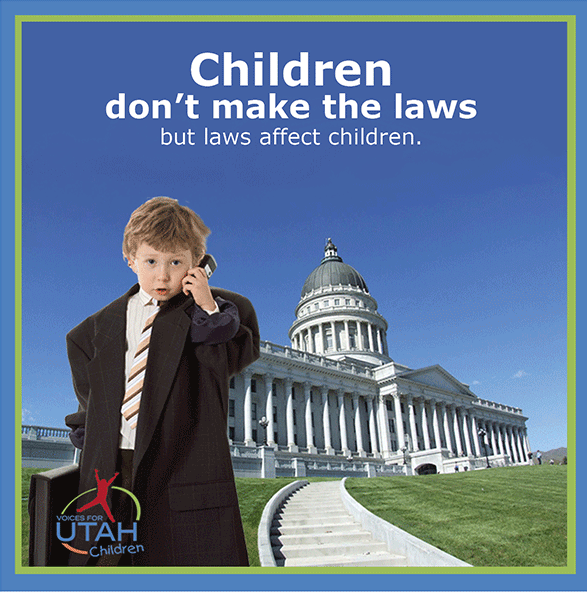 Tax and Budget Issues
Tax and Budget Issues
Creating a State Earned Income Tax Credit (EITC)
Restoring Investment in Children
Health Issues
12-Month Continuous Eligibility for Utah Kids with Medicaid
Early Childhood Care & Education Issues
High Quality Child Care
Governance and Coordination of Early Childcare Services
Juvenile Justice Issues
Implementing Juvenile Justice Reform
Bills
News Contact Lawmakers Sign Up for E-AlertsFollow @utchildren
For 30 years now, Voices for Utah Children has called on our state, federal and local leaders to put children’s needs first. But the work is not done. The children of 30 years ago now have children of their own. Too many of these children are growing up in poverty, without access to healthcare or quality educational opportunities.
How can you be involved?
Make a tax-deductible donation to Voices for Utah Children—or join our Network with a monthly donation of $20 or more. Network membership includes complimentary admission to Network events with food, socializing, and opportunity to meet child advocacy experts. And don't forget to join our listserv to stay informed!
We look forward to the future of Voices for Utah Children and we hope you will be a part of our next 30 years.
We'll count down the 2017 Utah Legislative Session with daily data about Utah kids.
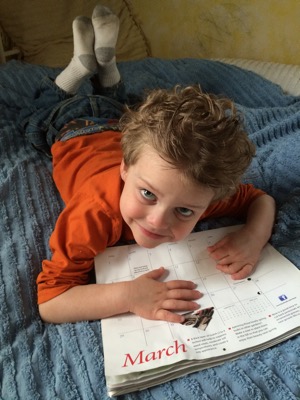 During the 2017 Legislative session, Utah lawmakers will be making decisions daily that will affect our state’s children and their families. At Voices for Utah Children, we know it’s important to make sure that decision makers have up-to-date, accurate, and accessible data to base their decisions on. That’s where our Utah KIDS COUNT Project comes in. Our annual “Measures of Child Well-Being” provides data on a variety of indicators at the county level.
During the 2017 Legislative session, Utah lawmakers will be making decisions daily that will affect our state’s children and their families. At Voices for Utah Children, we know it’s important to make sure that decision makers have up-to-date, accurate, and accessible data to base their decisions on. That’s where our Utah KIDS COUNT Project comes in. Our annual “Measures of Child Well-Being” provides data on a variety of indicators at the county level.
In addition, this year, the Utah KIDS COUNT project is proud to introduce our latest data product: a “page-a-day” countdown calendar! This daily electronic legislative calendar not only shares data, highlights programs, and policy solutions but also serves as a reminder of how many days are left in the legislative session to make a difference for kids. Please follow us @utchildren on twitter and like us on Facebook in order to get involved electronically as we count down the days in this year’s legislative session.
For 30 years now, Voices for Utah Children has called on our state, federal and local leaders to put children’s needs first. But the work is not done. The children of 30 years ago now have children of their own. Too many of these children are growing up in poverty, without access to healthcare or quality educational opportunities.
How can you be involved?
Make a tax-deductible donation to Voices for Utah Children—or join our Network with a monthly donation of $20 or more. Network membership includes complimentary admission to Network events with food, socializing, and opportunity to meet child advocacy experts. And don't forget to join our listserv to stay informed!
We look forward to the future of Voices for Utah Children and we hope you will be a part of our next 30 years.
Special thanks to American Express, our "Making a Difference All Year Long" sponsor. 

